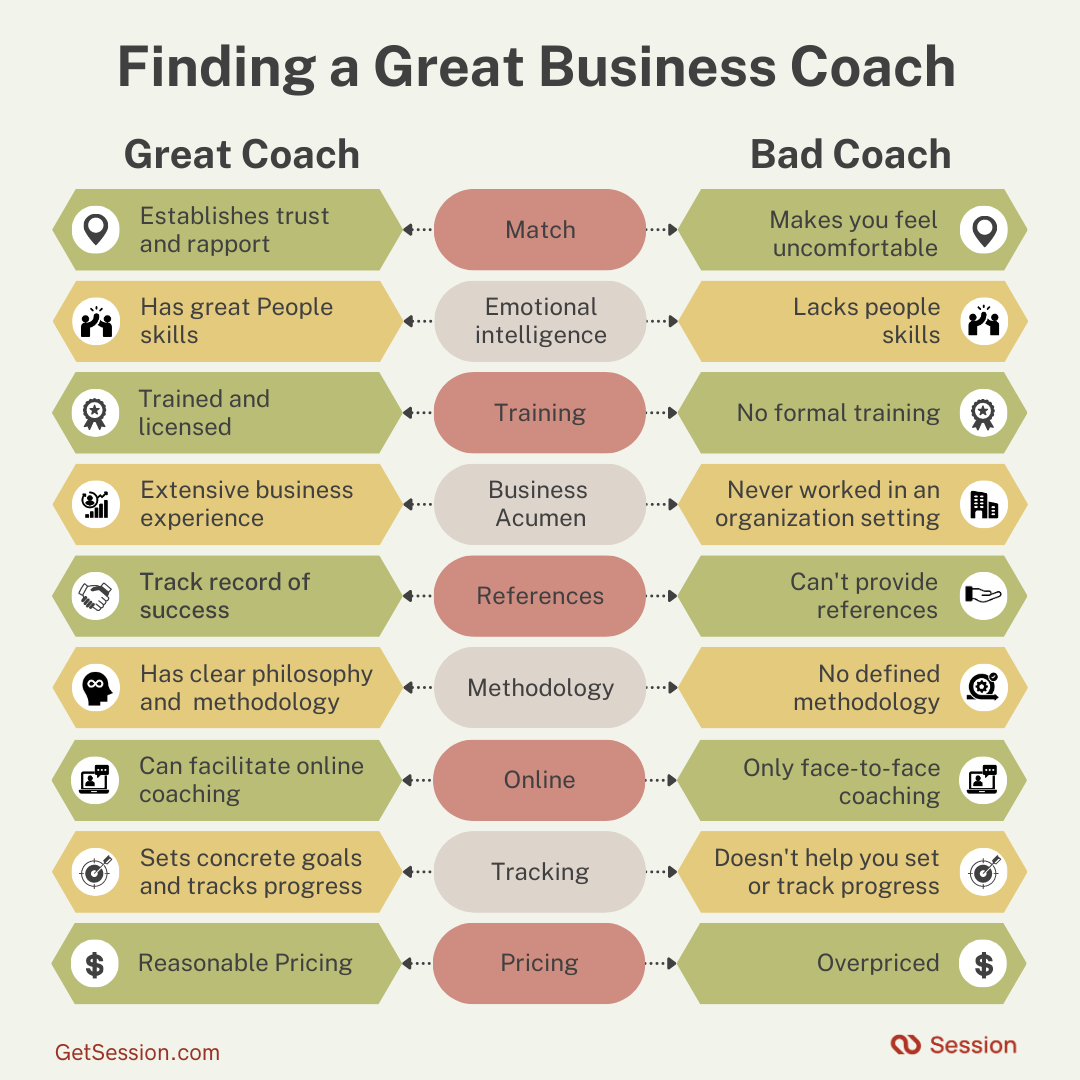With so many choices out there, selecting the right business coach can be an overwhelming task. However, when you know exactly what to look for, you can narrow down your search accordingly and make the process go far more seamlessly. We have narrowed down our top 9 things to consider when selecting the right business coach:

1. The Right Match
Personalities matter! In order for the business coaching to be efficient, you need to trust the person coaching you. When selecting your coach, don’t shy away from selecting based on gut-feeling and intuition in the first place - as long as you also consider all the other things listed in this guide. Intuition is our sixth sense telling us something of importance, that we should listen to and trust, also when it comes to selecting the right coach.
2. People Skills and Emotional Intelligence
Although the outcome of business coaching relates to business outcomes, it also relates to personal growth and development. For this reason, a business coach has to have the necessary people skills and emotional intelligence to make a lasting impact on the client.
The baseline qualities to look for in this category include:
- Active listening skills and compassion – they hear what you do and don’t say - in other words, they read between the lines of what you are saying.
- Empathy and high-level emotional intelligence – they can read emotive indicators and body language even virtually.
- The ability to ask deep, evocative, relevant questions, opening your mind to new possibilities and perspectives.
- Strengths Focus - which means the coach looks for, enlarges, highlights and helps you identify, understand, appreciate, and apply strengths and how these can compensate for weaknesses.
- Balancing the act of being challenging, supporting, provoking, and motivating.
3. Education and Training
In order to offer effective business coaching, the coach needs to have undergone extensive training within coaching. Formal training gives your coach guidance on their personality, style of interaction, own psychological strengths, and barriers. On top of this, well-educated coaches receives continious feedback and supervision.
To understand if your coach has undergone intense training, simply ask for his/her license, degree and educational background. Make sure the education is formal and recognized, based on more than just a few days of training. Among the most trustworthy coaching institutions in the world are the International Coaching Federation (ICF) and the European Mentoring and Coaching Council (EMCC).
Trained and Licensed Business Psychologists also have years of training and supervision behind their title. You may also find extremely well trained coaches amongst former HR professionals, or even managers, who have “upgraded” themselves with a coaching education.
4. Elite Business Acumen and Organizational Experience
A business coach naturally understands organizational political dynamics and is knowledgeable in what it means to lead and work in modern organizations. One way to test the potential coach’s business acumen is to ask them how they intend to help you solve real-life business issues and challenges.
Also, notice:
- How does the coach speak about strategy and the strategy of your organization?
- What challenges do they foresee for your business?
- How is “working in a modern organization” spoken about?
- What great advice or questions does the coach have when it comes to your organizational problems or dilemmas?
A deep understanding of strategic issues, challenges of working and leading in modern organizations of today, political patterns as well team dynamics is paramount in order for the coach to be able to help you cope, work, thrive and lead in an organizational context.
5. Stellar References and Recommendations
Don’t be afraid to ask the coach for previous references and recommendations. It will be hard to trust a coach who does not have clients that will vouch for them. And without trust, you won’t get the most out of the coaching journey.
6. Coaching Methodology and Philosophy
When selecting a business coach, it’s also important to consider which type of coaching methodology and philosophy they use, and if it suits your needs accordingly. Remember, there are a lot of different ways to be coached. In Session, we believe in building on Strenghts, trying out the things talked about in the coaching sessions, in imagining the next new and looking for collaboration and partnerships, wherever possible. And, all of our coaches have business acumen, of course.
7. Can the Coach Deliver Online Coaching?
When selecting a business coach, consider and ask whether they can facilitate online coaching. Given the upfront benefits of online coaching, including the flexibility, timesaving and smoothness of just having to open up your computer, we encourage you to find a coach who can do online coaching.
8. Can The Coach Help You Measure Concrete Goals and Track Success?
For you to evaluate whether the coaching journey will help or not, it is important that the coach can set goals with you from the get-go. When selecting a business coach, make sure to ask them how they can help you measure concrete goals and track success.
Fluffy promises like “it will be great” or “it's hard to measure, but I know from experience that it works” won’t help you in the long run. The majority of clients, employees and businesses, need concrete and tangible ROI proof to maintain a coaching budget. A great business coach will not shy away from helping you measure and prove progress, in fact, they will insist you do!
8. Reasonable Pricing
Cost of the coaching is inevitably a significant factor, so be sure to consider a cost that you or your organization can sustain in the long-run. Although there is no specific set cost to look for, we know for a fact that online coaching very often can be offered at a lower price than in-person coaching. The price does not always reflect the quality, so be mindful of what you end up paying, since motivational coaches very often cost a fortune, whereas very well educated business coaches might be available at a lower price.
Summing Up
Choosing the right coach is no easy task. Follow the steps above, and you are one step closer to starting on a valuable journey which might very well get you closer to living your strengths, dreams and aspirations.










